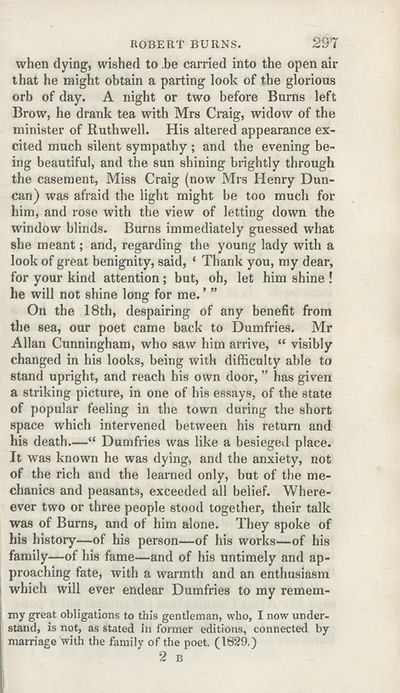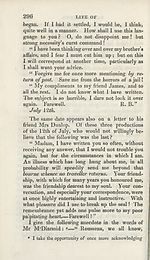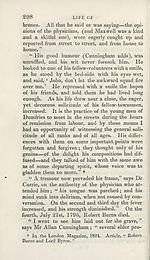Scotland/Scots > Life of Robert Burns
(307)
Download files
Complete book:
Individual page:
Thumbnail gallery: Grid view | List view

ROBERT BURNS.
297
when dying, wished to be carried into the open air
that he might obtain a parting look of the glorious
orb of day. A night or two before Burns left
Brow, he drank tea with Mrs Craig, widow of the
minister of Ruthwell. His altered appearance ex¬
cited much silent sympathy ; and the evening be¬
ing beautiful, and the sun shining brightly through
the casement, Miss Craig (now Mrs Henry Dun¬
can) was afraid the light might be too much for
him, and rose with the view of letting down the
window blinds. Burns immediately guessed what
she meant; and, regarding the young lady with a
look of great benignity, said, ‘ Thank you, my dear,
for your kind attention; but, oh, let him shine !
he will not shine long for me. ’ ”
On the 18th, despairing of any benefit from
the sea, our poet came back to Dumfries. Mr
Allan Cunningham, who saw him arrive, “ visibly
changed in his looks, being with difficulty able to
stand upright, and reach his own door, ” has given
a striking picture, in one of his essays, of the state
of popular feeling in the town during the short
space which intervened between his return and
his death—“ Dumfries was like a besieged place.
It was known he was dying, and the anxiety, not
of the rich and the learned only, but of the me¬
chanics and peasants, exceeded all belief. Where-
ever two or three people stood together, their talk
was of Burns, and of him alone. They spoke of
his history—of his person—of his works—of his
family—of his fame—and of his untimely and ap¬
proaching fate, with a warmth and an enthusiasm
which will ever endear Dumfries to my remem-
my great obligations to this gentleman, who, I now under¬
stand, is not, as stated in former editions, connected by
marriage with the family of the poet. (1829.)
2 B
297
when dying, wished to be carried into the open air
that he might obtain a parting look of the glorious
orb of day. A night or two before Burns left
Brow, he drank tea with Mrs Craig, widow of the
minister of Ruthwell. His altered appearance ex¬
cited much silent sympathy ; and the evening be¬
ing beautiful, and the sun shining brightly through
the casement, Miss Craig (now Mrs Henry Dun¬
can) was afraid the light might be too much for
him, and rose with the view of letting down the
window blinds. Burns immediately guessed what
she meant; and, regarding the young lady with a
look of great benignity, said, ‘ Thank you, my dear,
for your kind attention; but, oh, let him shine !
he will not shine long for me. ’ ”
On the 18th, despairing of any benefit from
the sea, our poet came back to Dumfries. Mr
Allan Cunningham, who saw him arrive, “ visibly
changed in his looks, being with difficulty able to
stand upright, and reach his own door, ” has given
a striking picture, in one of his essays, of the state
of popular feeling in the town during the short
space which intervened between his return and
his death—“ Dumfries was like a besieged place.
It was known he was dying, and the anxiety, not
of the rich and the learned only, but of the me¬
chanics and peasants, exceeded all belief. Where-
ever two or three people stood together, their talk
was of Burns, and of him alone. They spoke of
his history—of his person—of his works—of his
family—of his fame—and of his untimely and ap¬
proaching fate, with a warmth and an enthusiasm
which will ever endear Dumfries to my remem-
my great obligations to this gentleman, who, I now under¬
stand, is not, as stated in former editions, connected by
marriage with the family of the poet. (1829.)
2 B
Set display mode to:
![]() Universal Viewer |
Universal Viewer | ![]() Mirador |
Large image | Transcription
Mirador |
Large image | Transcription
| Antiquarian books of Scotland > Scotland/Scots > Life of Robert Burns > (307) |
|---|
| Permanent URL | https://digital.nls.uk/108249543 |
|---|
| Description | Thousands of printed books from the Antiquarian Books of Scotland collection which dates from 1641 to the 1980s. The collection consists of 14,800 books which were published in Scotland or have a Scottish connection, e.g. through the author, printer or owner. Subjects covered include sport, education, diseases, adventure, occupations, Jacobites, politics and religion. Among the 29 languages represented are English, Gaelic, Italian, French, Russian and Swedish. |
|---|

